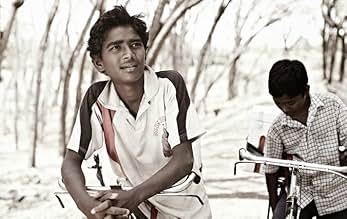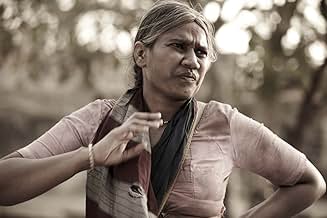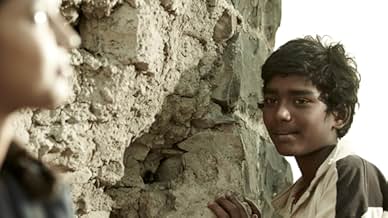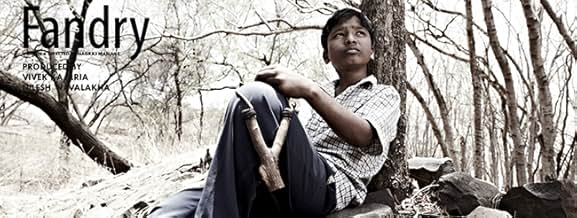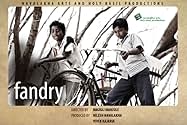IMDb रेटिंग
8.2/10
2.8 हज़ार
आपकी रेटिंग
यह एक दलित (उत्पीड़ित जाति) परिवार के एक किशोर के बारे में है, जो गांव के किनारे पर रहता है, और उसे एक उच्च जाति की लड़की से प्यार हो जाता है.यह एक दलित (उत्पीड़ित जाति) परिवार के एक किशोर के बारे में है, जो गांव के किनारे पर रहता है, और उसे एक उच्च जाति की लड़की से प्यार हो जाता है.यह एक दलित (उत्पीड़ित जाति) परिवार के एक किशोर के बारे में है, जो गांव के किनारे पर रहता है, और उसे एक उच्च जाति की लड़की से प्यार हो जाता है.
- पुरस्कार
- 4 जीत और कुल 1 नामांकन
फ़ीचर्ड समीक्षाएं
I can even say this is the only movie that I have seen till date which is so authentic in its execution. The story revolves around a young boy(Jabya)who is a victim of the social inequality due to casteism in a village. The entire film drives in a direction where the group of people in the village infuriate the boy by abusing him and his family with his caste calling them "Fandri" (Pig), but he remains calm as his family is dependent on the village. The accumulation of all this anger, fear, fury get outburst in the climax act.
Everyone in the cast has done a extraordinary performance, there is nowhere where you can see any cinematic sequence. This credit should go the director of the movie (Nagraj Manjule). The amount of ground work that is there in this movie is enormous. Every single detail on the character, or the locations and sequence is something really unbelievable. One thing that can be quoted for instance is the place where Jabya's sister asks water in one of the homes when she runs and gasps. The anonymous character from the home doesn't hands over the water to her instead keeps it down to avoid the touch of inferior caste.
In the era of highly moving camera and fast action cuts, the camera work in the movie just shows the power of still cinematography which elevated the movie to the much higher level.
The movie is just one great masterpiece from the debut director !
Everyone in the cast has done a extraordinary performance, there is nowhere where you can see any cinematic sequence. This credit should go the director of the movie (Nagraj Manjule). The amount of ground work that is there in this movie is enormous. Every single detail on the character, or the locations and sequence is something really unbelievable. One thing that can be quoted for instance is the place where Jabya's sister asks water in one of the homes when she runs and gasps. The anonymous character from the home doesn't hands over the water to her instead keeps it down to avoid the touch of inferior caste.
In the era of highly moving camera and fast action cuts, the camera work in the movie just shows the power of still cinematography which elevated the movie to the much higher level.
The movie is just one great masterpiece from the debut director !
Hollowness of Caste System Turned Into A Brilliant Screenplay That Reminds The Work Of Satyajit Ray,
This is truly an exemplary piece of art depicting the disparity in the Indian caste system which has plagued the Indian society for centuries & even today our society at large haven't been able to overcome.
This is a movie about the aspirations of a village teenage boy from a very poor family of lower caste "kaikade". The family consists of ayi, appa, mulga (son Jabya) & mulgi(daughter). The family earns their livelihood by taking care of the cleanliness of the village to catching of pigs roaming around the village, so it leaves no doubt on the audience of the movie to realize the family's standard of living. Inspite of the challenge of 'hand to mouth' existence, Jabya likes going to school & is in complete disapproval of his families profession, particularly catching of pigs so that the pigs do not mess up the cleanliness of the high class people living in the village.
The movie clearly depicts the Herculean task of a Father to get his daughter married particularly when the resources are scarce. The expressions of the father is very touching particularly when one tries to put himself in the shoes of a daughter's father, particularly because of the harsh circumstances of their struggle to merely survive. On the other hand, Jabya likes a girl from his class who is from higher class family & it is his strong desire to own a pair of new jeans & top just to look good & impress his love. This thought process itself proves the innocence of a pure soul which has fallen pray to the sweetness of love.
The movie ends with the self realization of Jabya that the society in which he is a part of, has no appreciation or value for his thought process & ultimately is left disgruntled, remorse, shattered & heart broken only to bring in the darker side of a shattered soul.
This writing wasn't an easy writing at all as compared to the other movies that I have watched & jotted down my feelings about it. It took me more than a days time to just to think & join in the dots of hollowness within our caste system. Last but not the least, every effort in making such great films that brings out the hollowness within society of so called noble & social living beings, deserves a great amount of respect & accolades in portraying the darkest side hidden somewhere within us. This movie , even though released in Marathi in 2013, in the so called era of "Hi-Fi Tech Savvy India", took me back to the era of 1960's the first ever Indian Academy Award winner Mr. Satyajit Ray who has made History in Indian Cinema for his epic titles "Pather Pachali, Aporajita & Apur Sansar" popularly known as "The Apu Trilogy". With existence of like minded filmmakers, it makes me believe beyond any doubt that the art of filmaking will stay alive for some more time for us to appreciate the hues of life.
This is a movie about the aspirations of a village teenage boy from a very poor family of lower caste "kaikade". The family consists of ayi, appa, mulga (son Jabya) & mulgi(daughter). The family earns their livelihood by taking care of the cleanliness of the village to catching of pigs roaming around the village, so it leaves no doubt on the audience of the movie to realize the family's standard of living. Inspite of the challenge of 'hand to mouth' existence, Jabya likes going to school & is in complete disapproval of his families profession, particularly catching of pigs so that the pigs do not mess up the cleanliness of the high class people living in the village.
The movie clearly depicts the Herculean task of a Father to get his daughter married particularly when the resources are scarce. The expressions of the father is very touching particularly when one tries to put himself in the shoes of a daughter's father, particularly because of the harsh circumstances of their struggle to merely survive. On the other hand, Jabya likes a girl from his class who is from higher class family & it is his strong desire to own a pair of new jeans & top just to look good & impress his love. This thought process itself proves the innocence of a pure soul which has fallen pray to the sweetness of love.
The movie ends with the self realization of Jabya that the society in which he is a part of, has no appreciation or value for his thought process & ultimately is left disgruntled, remorse, shattered & heart broken only to bring in the darker side of a shattered soul.
This writing wasn't an easy writing at all as compared to the other movies that I have watched & jotted down my feelings about it. It took me more than a days time to just to think & join in the dots of hollowness within our caste system. Last but not the least, every effort in making such great films that brings out the hollowness within society of so called noble & social living beings, deserves a great amount of respect & accolades in portraying the darkest side hidden somewhere within us. This movie , even though released in Marathi in 2013, in the so called era of "Hi-Fi Tech Savvy India", took me back to the era of 1960's the first ever Indian Academy Award winner Mr. Satyajit Ray who has made History in Indian Cinema for his epic titles "Pather Pachali, Aporajita & Apur Sansar" popularly known as "The Apu Trilogy". With existence of like minded filmmakers, it makes me believe beyond any doubt that the art of filmaking will stay alive for some more time for us to appreciate the hues of life.
This movie is staged in a rural village in India. It focuses on the young son of the only family of "untouchables" in the village. He hopes and dreams for more than he is allowed to have, which contrasts to the humiliations he must endure being of such a low caste. He also struggles with coming of age, as he finds he has feelings of attraction to a girl.
The story has a slower pace, allowing us to really experience and contemplate the daily life of this boy and his poverty-stricken family. Their struggles and the oppression they face feel more meaningful because these things are not exaggerated in the name of drama, instead realism is the focus.
The story has a slower pace, allowing us to really experience and contemplate the daily life of this boy and his poverty-stricken family. Their struggles and the oppression they face feel more meaningful because these things are not exaggerated in the name of drama, instead realism is the focus.
Regional cinema in India (that excludes Bollywood and the big mainstream Tamil and Telugu movies) occasionally yields little gems like this flick. I heard of it on a news program towards the end of 2014 - the anchor was listing her favorites from the year gone by and she mentioned this as a must-watch inter-caste school love story. That is not quite accurate - the love is deep but one-sided, unrequited, and as one realizes early on, rather hopeless. A low- caste school boy is smitten by the pretty high caste girl that he sees in school every day but centuries of caste stigma are not easily shaken off by sharing the same classroom. The low caste family is routinely humiliated and called upon to trap the wild pigs that roam the village - the rest of the villagers consider the pigs unclean and any contact with the pigs impure. The boy rages against the caste trap and his own father for forcing him to take part in trapping pigs. The movie unfolds slowly for most of its running time, and the high caste characters are almost caricatures in their cruel callousness. Yet, the movie comes alive with a brutal brilliance in the last 10 minutes as shame and fury collide within the tormented boy in an explosive climax. The very last scene is like a punch in the stomach as the raging boy seems to hurl a stone at the audience itself for being mute spectators to injustice.
Wow great movie I saw this in ilInternational Film Festival of Kerala. I personally got a chance to congratulate the director. Such a great movie. Shows how dalits are being treated in society. The man's invention of so called caste, making people uneducated. Its a clear cut of how people are being treated in India due to man's so called invention of caste.
क्या आपको पता है
- ट्रिवियाThe Director Nagraj Manjule had to convince Somnath Awaghade(Jabya) three months for this role. Somnath has grown up in rural area and has never appeared even in Screen related activity and he was taking director's words as a joke. But, ultimately he accepted the role.
- साउंडट्रैकFandry Theme Song
Composed by Alokananda Dasgupta
टॉप पसंद
रेटिंग देने के लिए साइन-इन करें और वैयक्तिकृत सुझावों के लिए वॉचलिस्ट करें
- How long is Fandry?Alexa द्वारा संचालित
विवरण
- चलने की अवधि1 घंटा 41 मिनट
- रंग
- पक्ष अनुपात
- 2.35 : 1
इस पेज में योगदान दें
किसी बदलाव का सुझाव दें या अनुपलब्ध कॉन्टेंट जोड़ें



